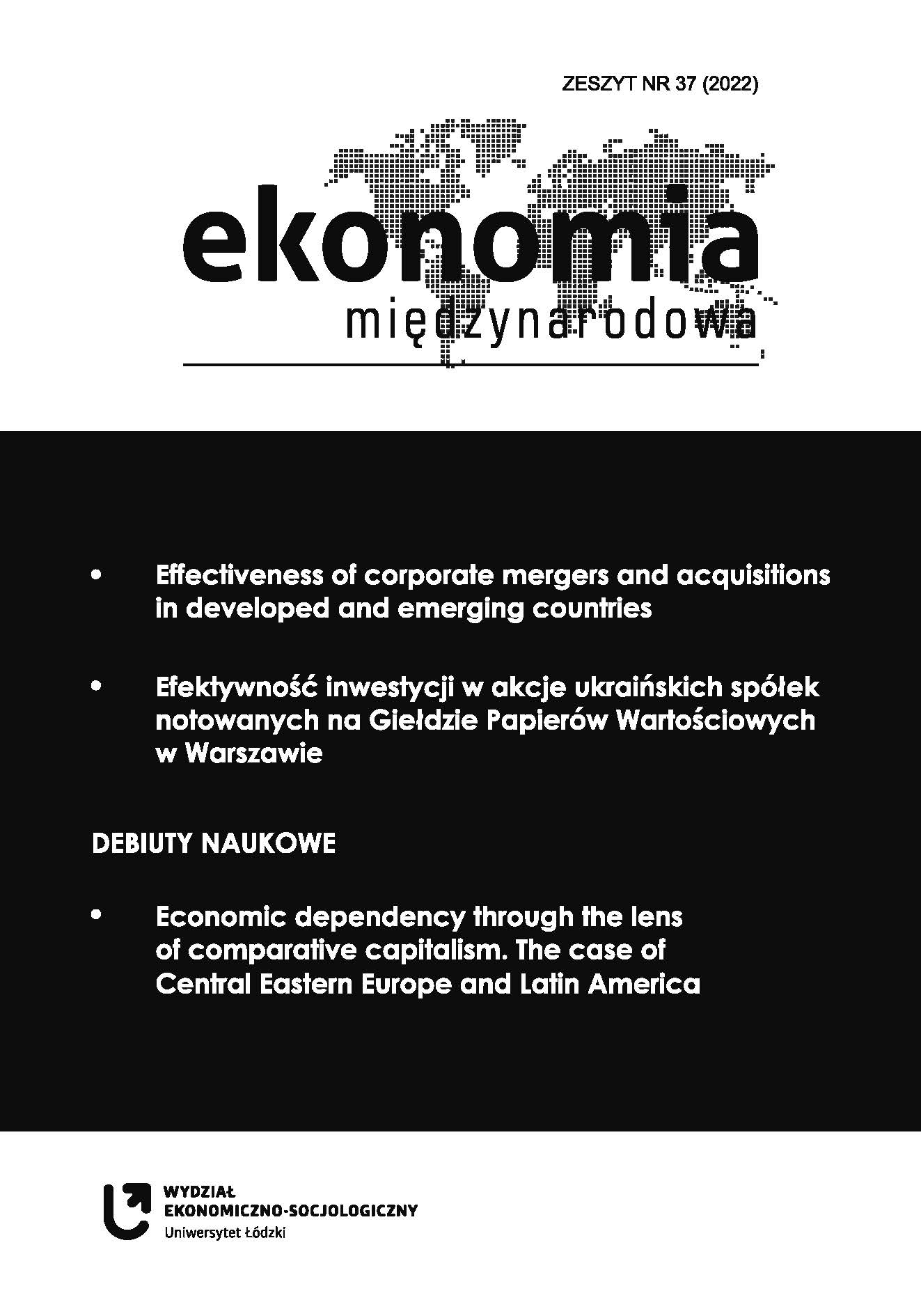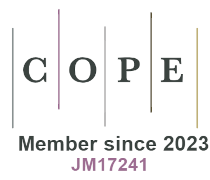Efektywność fuzji i przejęć przedsiębiorstw w krajach rozwiniętych i rozwijających się
DOI:
https://doi.org/10.18778/2082-4440.37.01Słowa kluczowe:
fuzje i przejęcia, zarządzanie finansami, wzrost przedsiębiorstwaAbstrakt
Celem artykułu jest porównanie efektów fuzji i przejęć realizowanych przez podmioty z krajów rozwiniętych i rozwijających się. Artykuł obejmuje transakcje konsolidacyjne zrealizowane w latach 2000–2018 przez giełdowe spółki z branży motoryzacyjnej. Obserwacji poddano 764 transakcje konsolidacyjne pozyskane z bazy Thomson Reuters Eikon, dla których przyjęto metodę pomiaru efektywności opartą o relację kursu akcji z indeksem giełdowym. Analizę danych przeprowadzono z wykorzystaniem metod statystyki opisowej oraz metod wnioskowania statystycznego. Porównanie efektywności fuzji i przejęć zrealizowanych w krajach rozwiniętych i rozwijających się nie wykazało istotnych różnic w sensie statystycznym. Oznacza to, że uwarunkowania makroekonomiczne kraju, z którego pochodzi przedsiębiorstwo, nie mają istotnego wpływu na szanse powodzenia realizowanej przez niego konsolidacji. Firmy z krajów rozwijających się okazały się bardziej rentowne i mniej zadłużone, posiadały także wyższą płynnością finansową. Z kolei podmioty z krajów rozwiniętych charakteryzowały się lepszymi wskaźnikami efektywności działania, co sugeruje, że osiągały wyższe marże. Rezultaty przeprowadzonego badania przeczą więc tezie o znaczeniu pozycji kosztowej dla efektywności podmiotów, zwłaszcza w krajach rozwijających się. Analiza wyników porównania obu grup przedsiębiorstw pozwala przypuszczać, że czynniki determinujące sukces konsolidacji mają charakter mikroekonomiczny i są niezależne od kraju, w którym realizowana jest transakcja.
Bibliografia
Aybar B., Ficici A. (2009), Cross-border acquisitions and firm value: An analysis of emerging-market multinationals, “Journal of International Business Studies”, 40(8): 1317–1338. https://doi.org/10.1057/jibs.2009.15
Google Scholar
DOI: https://doi.org/10.1057/jibs.2009.15
Bekaert G., Harvey C.R., Lundblad C.T., Siegel S. (2014), Political risk spreads, “Journal of International Business Studies”, 45(4): 471–493. https://doi.org/10.1057/jibs.2014.4
Google Scholar
DOI: https://doi.org/10.1057/jibs.2014.4
Ben-Amar W., André P. (2006), Separation of ownership from control and acquiring firm performance: The case of family ownership in Canada, “Journal of Business Finance & Accounting”, 33(3–4): 517–543. https://doi.org/10.1111/j.1468-5957.2006.00613.x
Google Scholar
DOI: https://doi.org/10.1111/j.1468-5957.2006.00613.x
Berry H. (2006), Leaders, laggards, and the pursuit of foreign knowledge, “Strategic Management Journal”, 27(2): 151–168. https://doi.org/10.1002/smj.509
Google Scholar
DOI: https://doi.org/10.1002/smj.509
Bhagat S., Malhotra S., Zhu P. (2011), Emerging country cross-border acquisitions: Characteristics, acquirer returns and cross-sectional determinants, “Emerging Markets Review”, 12(3): 250–271. https://doi.org/10.1016/j.ememar.2011.04.001
Google Scholar
DOI: https://doi.org/10.1016/j.ememar.2011.04.001
Brouthers K.D., Hennart J.F. (2007), Boundaries of the firm: Insights from international entry mode research, “Journal of Management”, 33(3): 395–425. https://doi.org/10.1177/0149206307300817
Google Scholar
DOI: https://doi.org/10.1177/0149206307300817
Bruner R.F. (2002), Does M&A pay? A survey of evidence for the decision-maker, “Journal of Applied Finance”, 12(1): 48–68.
Google Scholar
Campa J.M., Hernando I. (2004), Shareholder value creation in European M&As, “European Financial Management”, 10(1): 47–81. https://doi.org/10.1111/j.1468-036X.2004.00240.x
Google Scholar
DOI: https://doi.org/10.1111/j.1468-036X.2004.00240.x
Cao C., Liu G. (2013), Political uncertainty and cross-border mergers & acquisitions, Working Paper. http://zicklin.baruch.cuny.edu/faculty/accountancy/events-research-workshops/Downloads/SWUFE-Chunfang_Cao.pdf (accessed: 15.07.2022)
Google Scholar
Chen Y.Y., Young M.N. (2010), Cross-border mergers and acquisitions by Chinese listed companies: A principal–principal perspective, “Asia Pacific Journal of Management”, 27(3): 523–539. https://doi.org/10.1007/s10490-009-9150-7
Google Scholar
DOI: https://doi.org/10.1007/s10490-009-9150-7
Cui L., Meyer K.E., Hu H.W. (2014), What drives firms’ intent to seek strategic assets by foreign direct investment? A study of emerging economy firms, “Journal of World Business”, 49(4): 488–501.
Google Scholar
DOI: https://doi.org/10.1016/j.jwb.2013.12.003
Dietz M.C., Orr G., Xing J. (2008). How Chinese companies can succeed abroad, “McKinsey quarterly”, 3: 22.
Google Scholar
Eckbo B.E., Thorburn K.S., (2000), Gains to bidder firms revisited: Domestic and foreign acquisitions in Canada, “Journal of Financial and Quantitative Analysis”, 35(1): 1–25. https://doi.org/10.2307/2676236
Google Scholar
DOI: https://doi.org/10.2307/2676236
Faccio M., McConnell J.J., Stolin D. (2006), Returns to acquirers of listed and unlisted targets, “Journal of Financial and Quantitative Analysis”, 41(1): 97–220. https://doi.org/10.1017/S0022109000002477
Google Scholar
DOI: https://doi.org/10.1017/S0022109000002477
Goergen M., Renneboog L., (2004), Shareholder wealth effects of European domestic and cross-border takeover bids, “European Financial Management”, 10(1): 9–45. https://doi.org/10.1111/j.1468-036X.2004.00239.x
Google Scholar
DOI: https://doi.org/10.1111/j.1468-036X.2004.00239.x
Gubbi S.R., Aulakh P.S., Ray S., Sarkar M.B., Chittoor R. (2010), Do international acquisitions by emerging-economy firms create shareholder value? The case of Indian firms, “Journal of International Business Studies”, 41(3): 397–418. https://doi.org/10.1057/jibs.2009.47
Google Scholar
DOI: https://doi.org/10.1057/jibs.2009.47
Karaszewski W., Jaworek M., Szałucka M. (2018), Greenfield or Acquisition Entry? An Impact of Foreign Direct Investment on the Competitiveness of Polish Investors, “Entrepreneurial Business and Economics Review”, 6(2): 137–152. https://doi.org/10.15678/EBER.2018.060207
Google Scholar
DOI: https://doi.org/10.15678/EBER.2018.060207
Karaszewski W.M., Jaworek M., Szałucka M. (2018), Foreign Direct Investment Determinants among Polish Companies: Greenfield Investments vs. Acquisitions, “Trends Economics and Management”, 12(31): 19–30. https://doi.org/10.13164/trends.2018.31.19
Google Scholar
DOI: https://doi.org/10.13164/trends.2018.31.19
Lin X., Li Y., Wan X., Wei J. (2020), Market reaction to the international acquisitions by Chinese firms: The role of potential intelligence sourcing and preannouncement, “Chinese Management Studies”, 14(4): 915–934. https://doi.org/10.1108/CMS-11-2019-0394
Google Scholar
DOI: https://doi.org/10.1108/CMS-11-2019-0394
Liu X., Gao L., Lu J., Lioliou, E. (2016), Environmental risks, localization and the overseas subsidiary performance of MNEs from an emerging economy, “Journal of World Business”, 51(3): 356–368. https://doi.org/10.1016/j.jwb.2015.05.002
Google Scholar
DOI: https://doi.org/10.1016/j.jwb.2015.05.002
Martynova M., Renneboog L., (2008), A century of corporate takeovers: What have we learned and where do we stand?, “Journal of Banking & Finance”, 32(10): 2148–2177. https://doi.org/10.1016/j.jbankfin.2007.12.038
Google Scholar
DOI: https://doi.org/10.1016/j.jbankfin.2007.12.038
Masulis R.W., Wang C., Xie F. (2007), Corporate governance and acquirer returns, “The Journal of Finance”, 62(4): 1851–1889. https://doi.org/10.1111/j.1540-6261.2007.01259.x
Google Scholar
DOI: https://doi.org/10.1111/j.1540-6261.2007.01259.x
Moeller S.B., Schlingemann F.P., (2005), Global diversification and bidder gains: A comparison between cross-border and domestic acquisitions, “Journal of Banking & Finance”, 29(3): 533–564. https://doi.org/10.1016/S0378-4266(04)00047-0
Google Scholar
DOI: https://doi.org/10.1016/S0378-4266(04)00047-0
Nicholson R.R., Salaber J. (2013), The motives and performance of cross-border acquirers from emerging economies: Comparison between Chinese and Indian firms, “International Business Review”, 22(6): 963–980. https://doi.org/10.1016/j.ibusrev.2013.02.003
Google Scholar
DOI: https://doi.org/10.1016/j.ibusrev.2013.02.003
OECD.org – OECD (2013), https://www.oecd.org/
Google Scholar
Pástor L., Veronesi P. (2013), Political uncertainty and risk premia, “Journal of Financial Economics”, 110(3): 520–545. https://doi.org/10.1016/j.jfineco.2013.08.007
Google Scholar
DOI: https://doi.org/10.1016/j.jfineco.2013.08.007
Renneboog L., Vansteenkiste C. (2019), Failure and success in mergers and acquisitions, “Journal of Corporate Finance”, 58: 650–699.
Google Scholar
DOI: https://doi.org/10.1016/j.jcorpfin.2019.07.010
Sudarsanam S., Holl P., Salami A. (1996), Shareholder wealth gains in mergers: Effect of synergy and ownership structure, “Journal of Business Finance & Accounting”, 23(5–6): 673–698. https://doi.org/10.1111/j.1468-5957.1996.tb01148.x
Google Scholar
DOI: https://doi.org/10.1111/j.1468-5957.1996.tb01148.x
Sudarsanam S., Mahate A.A. (2003), Glamour acquirers, method of payment and post-acquisition performance: The UK evidence, “Journal of Business Finance & Accounting”, 30(1–2): 299–342.
Google Scholar
DOI: https://doi.org/10.1111/1468-5957.00494
Sun S.L., Peng M.W., Ren B., Yan D. (2012), A comparative ownership advantage framework for cross-border M&As: The rise of Chinese and Indian MNEs, “Journal of World Business”, 47(1): 4–16. https://doi.org/10.1016/j.jwb.2010.10.015
Google Scholar
DOI: https://doi.org/10.1016/j.jwb.2010.10.015
Szymczak, W. (2008), Podstawy statystyki dla psychologów: Podręcznik akademicki (pp. 198–200), Centrum Doradztwa i Informacji Difin, Warszawa.
Google Scholar
worldbank.org. (2018), GDP (current US$) | 1997–2017 by country. PKB 1997–2017. https://data.worldbank.org/indicator/NY.GDP.MKTP.CD?end=2017&start=1997
Google Scholar
Zhu P., Malhotra S. (2008), Announcement effect and price pressure: An empirical study of cross-border acquisitions by Indian firms, “International Research Journal of Finance and Economics”, 13(1): 24–41.
Google Scholar
Pobrania
Opublikowane
Jak cytować
Numer
Dział
Licencja

Utwór dostępny jest na licencji Creative Commons Uznanie autorstwa – Użycie niekomercyjne – Bez utworów zależnych 4.0 Międzynarodowe.









